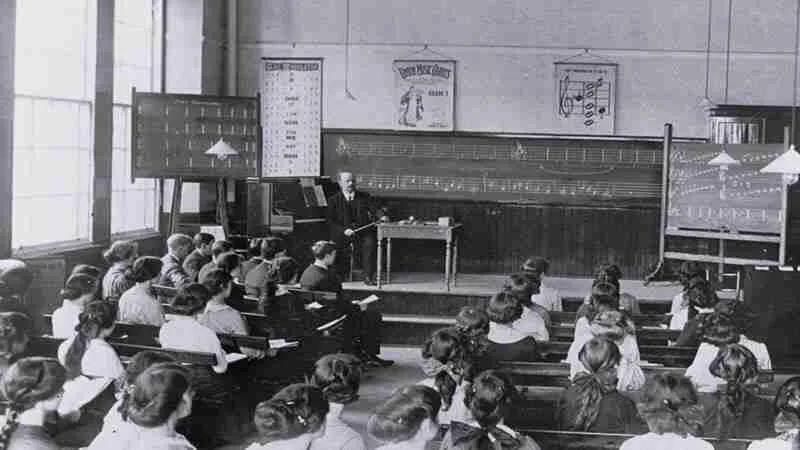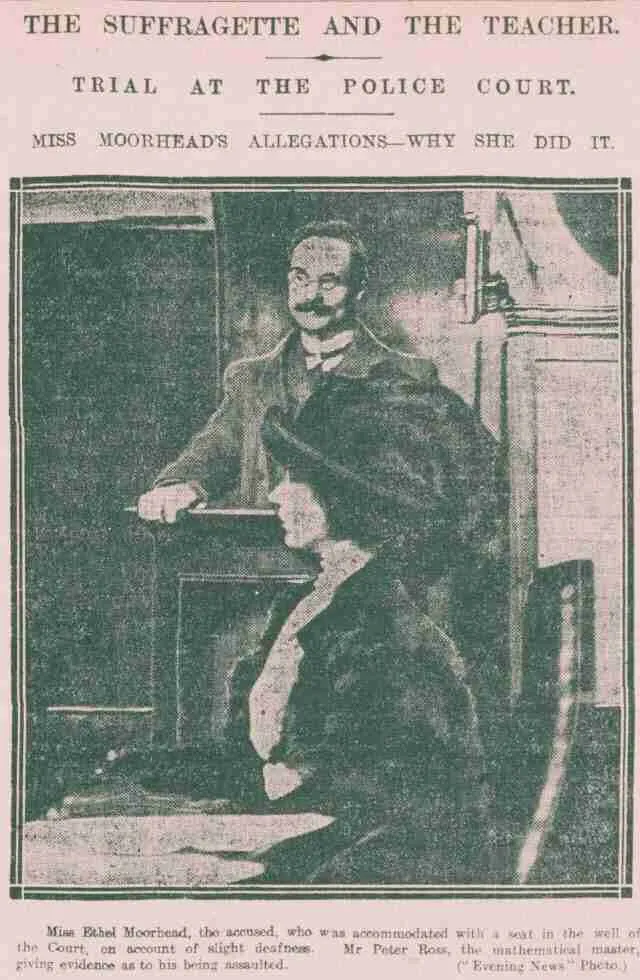Researching an old occupation helps us to understand how our ancestors lived and worked. Among these professions, the role of the teacher stands out because they shaped the minds of generations. This blog post, as part of my series on old occupations, looks at the history of Scottish education and how to find your ancestral teacher in pre-19th century records . It is important to understand the history because it will help you to understand where to find the records.
History of education in Scotland & the old occupation of teaching
The Birth of Education
In 1496, an Act of Parliament aimed to promote education, primarily among the wealthy. King James IV recognised the importance of legal knowledge for administering justice and mandated schools to educate landowners’ eldest sons, marking the start of the old occupation of teaching. Families faced a fine if their sons didn’t attend. The Royal High School of Edinburgh, established in the 12th century, played a pivotal role during this period.
Spiritual Reform and Education
By 1560, John Knox and clergymen outlined guidelines in the “First Book of Discipline.” They encouraged every parish to establish schools for “virtuous education and godly upbringing.” These schools became as crucial as pulpits, laying the foundation for Scotland’s educational movement.
The ‘Act for Settling of Schools’
In 1696, the Scottish Parliament passed the “Act for Settling of Schools,” requiring every parish to have a school. This act introduced a parochial arrangement where the kirk and heritors, landowners jointly provided schools, accommodation, and salaries for schoolmasters.
A Pathway to Literacy and Morality
Schools not only fostered literacy but also served as conduits for moral beliefs. Churches taught young parishioners to read the bible, reinforcing expected values. Parochial teachers enjoyed legal recognition, basic wages, and security of tenure.
A Turning Point in the Old Occupation
As the 19th century unfolded, Scotland experienced a pivotal moment in education. The Education (Scotland) Act of 1872 was an historical event when school boards were established. These boards represented a move toward centralised governance, emphasising the importance of education for all. No longer confined to the privileged few, education became a right accessible to every child.
My ancestor was a teacher …
before 1872:
- If your ancestor had the old occupation of a schoolmaster or teacher before 1872, the kirk session minutes available on the ScotlandsPeople website would be the best source of information. The kirk (church) was responsible for identifying suitable candidates to teach their young parishioners. Teachers were also recruited as clerks (precentors) for the church because they could write, providing an additional income source.
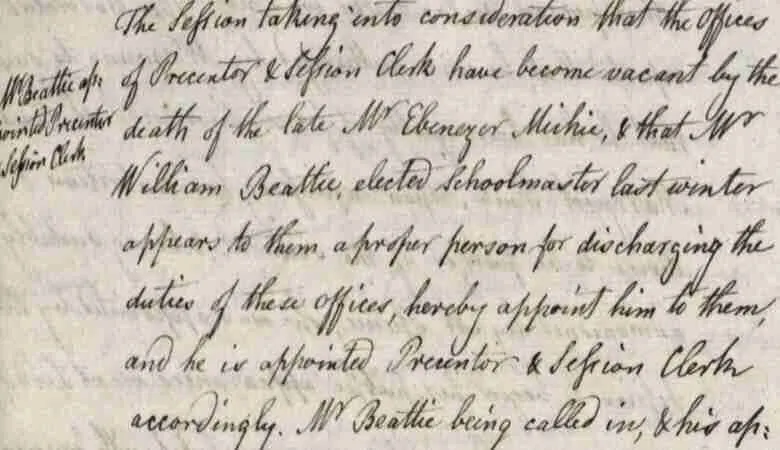
- The Presbytery minutes, from ScotlandsPeople website, of local parishes can also offer an insight into teachers’ behaviours. The Presbytery was a church court above the kirk session that dealt with serious cases of misbehaviours such as witchery or, as in the case below, complaints from parishioners about their teacher’s poor performance:
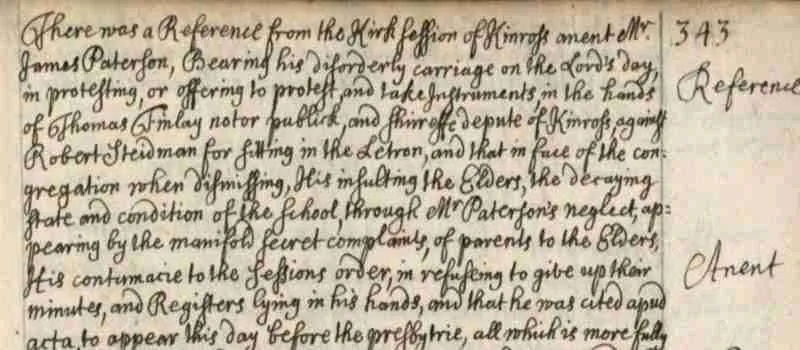
after 1872:
- For ancestors who were teachers after 1872, school log books are an excellent resource. These are normally held at the city’s archives, such as the Edinburgh City Archives or the Glasgow City Archives.
However, not all schools were diligent in preserving their historical log books, and some may have been thrown away when they were tidying up. Despite this, it is always worth contacting the school in question. Private schools, like Edinburgh Stewart Melville School, often maintain their own archival records.
Log books are similar to diaries written by the headmaster about the daily activities of the school. These might include attendance figures, subjects taught, teacher absences, inspections, events, and even teacher fatalities from the First World War. If you are lucky, they might list teachers or provide details about individual teachers.
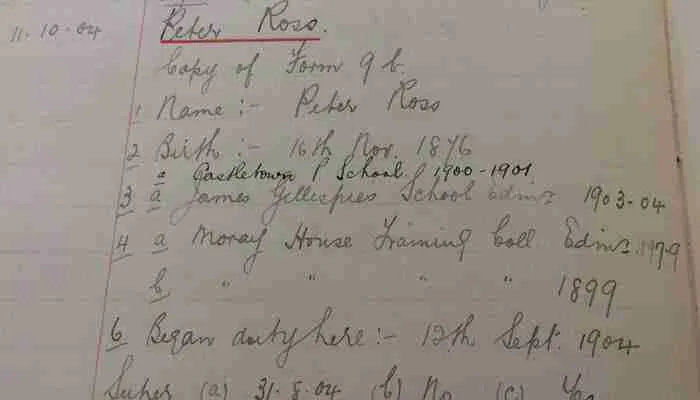
- School magazines, popular for promoting schools to former pupils, can also be found at local archives or libraries. They will mention teachers’ names if they were a casualty during the first world war. In this school magazine, an entry was included to encourage former pupils to join the Student’s Company as part of Sir George McCrae’s Battalion:

- School photos, which can put a face to a name, are a wonderful find for family historians. These can be located at local archives or possibly at the school itself.
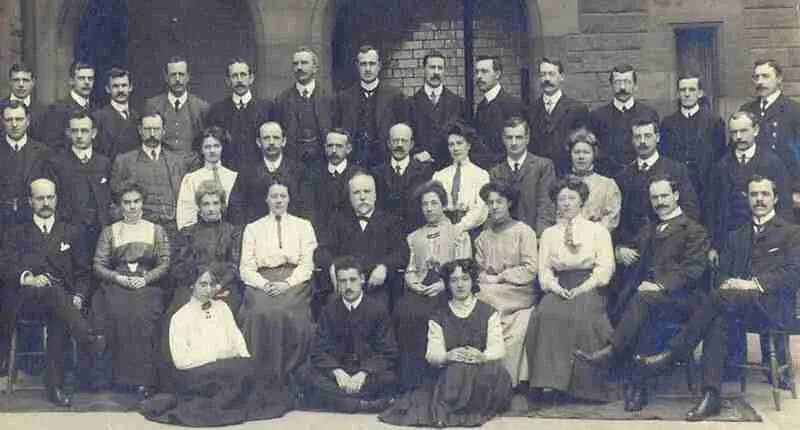
Additional Resources:
- Newspapers are a great resource for anyone researching their ancestors, especially if they were involved in notable events or misdeeds. For example, Peter Ross was in court because suffragette Ethel Moorhead entered his classroom when he was teaching and tried to whip him. She was distressed because he had allegedly insulted her the day before:
- Local libraries often have histories about schools. For instance, the Perth local and family history department houses books about local Perth schools, such as the History of Perth Academy by Edward Smart.
- Museums, like the History of Education Centre in Edinburgh, offer a glimpse into the teaching or learning experiences of your ancestors.
These resources can provide valuable insights into the old occupation of teaching. So, was your ancestor a teacher?
If you thought this was interesting then let me know in the comments below. Also, if you want me to research another old occupation, then leave a comment.
Enjoyed this post?
Join me and learn more about your Scottish family history.
Good luck with your research.
Until my next post, haste ye back.
You may also like...
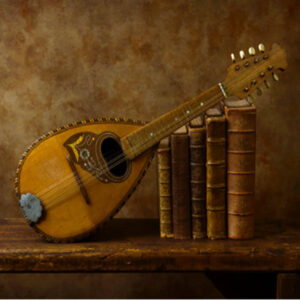
The Baird Surname: Meaning, Origin and History
The Baird surname is an old Scottish name that dates back to the medieval period. It comes from the Gaelic word ‘bardd’ meaning minstrel or bard.
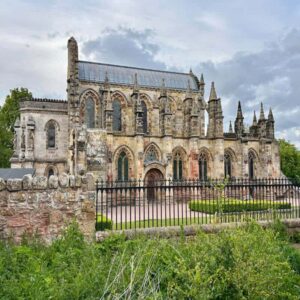
Roslin Village: Its History and Heritage
Roslin village is known for its chapel and castle, attracting genealogists, historians, and visitors interested in its past.
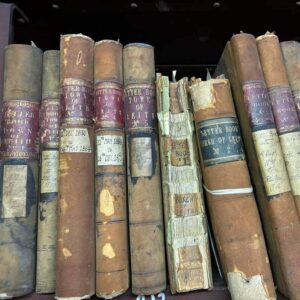
Celebrating International Archives Day
International Archives Day is on the 9th of June. It is an opportunity to recognise the value of archives in preserving our history and identity.
